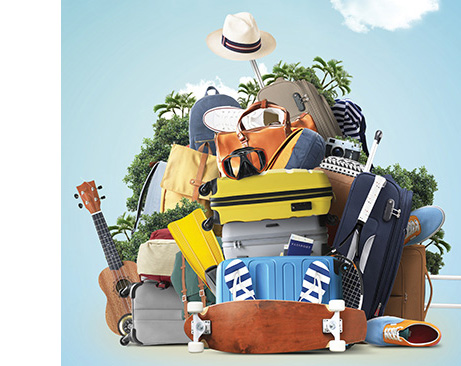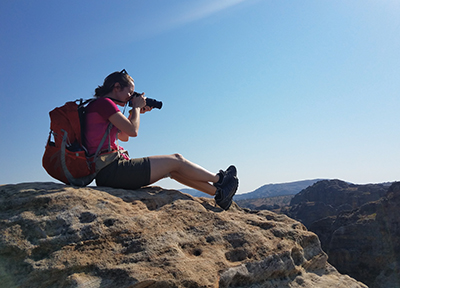By Rene Agredano
Tips and Tricks for Stress-free Trips

Beep! Beep! Beep! Lights flashed on the airport metal detector the moment Angelina Boulicault stepped inside. She paused, glanced at the line of curious passengers, then shrugged. Giddy with anticipation for her weekend getaway, she confidently stepped aside to roll up her right pant leg and reveal her prosthesis. “Go ahead, pat me down,” she said to the Transportation Security Administration (TSA) agent. “And hurry, please. I need to get to San Diego!”
To the 27-year-old biomedical engineer, it was just another flight to catch. She exuded confidence during the screening, but not long ago, getting singled out would have made her want to head home. As the founder of Adaptive Amputees (adaptiveamputees.boundless-journey.com), this avid hiker now does her best to embrace everything about the travel experience. Doing so helps her see the world—and herself—from an all-new, positive perspective.
The idea of a vacation during the age of COVID sometimes seems like more hassle than it’s worth. But as Boulicault and others know, once you master the art of adaptive travel, you’ll discover that going places safely is easier than you thought. Whether you want to visit Atlanta or Amsterdam, these pandemic travel tips can take some of the worries out of globetrotting.

Great Trips Start With Great Planning
Keep your perceptions in check when thinking about traveling. For instance, just because your hometown is (or is not) accessible, don’t assume that other places are equally easy or difficult to navigate. Regardless, first-time adaptive travelers can enjoy the best chance at a good travel experience by exploring within the United States, where the Americans with Disabilities Act (ADA) is most likely to apply. Not everywhere will be accessible, but once you’ve nailed the ins and outs of domestic travel, it’s easier to set sail for other lands. Pre-trip planning is crucial to make it a success.
John Morris learned about trip planning the hard way. The 30-year-old triple amputee and founder of WheelchairTravel.org was just six weeks post-amputation when his alma mater’s football team made it to the Rose Bowl national championship game. Buoyed by a lifetime of adventure travel before limb loss, Morris bought tickets to the game. There was just one problem: He didn’t research accessibility at his destination. Unaware of the importance of doing so, his game day excitement quickly fizzled when it took several hours to get accessible transportation from the stadium back to his hotel. Morris realized he made one of the biggest mistakes of newbie adaptive travelers: not doing enough pre-trip research.
The internet is filled with great adaptive travel resources, but Morris urges his readers to verify that information. “A simple internet search about the accessibility of a destination, unless it comes from a trusted source, is not always accurate,” he explains. Many websites rely on material contributed by second- or even third-hand able-bodied writers who haven’t visited the location they are spotlighting. Suggestions to help you avoid this type of misinformation include:
Talking to other adaptive needs travelers who have been to the places you want to visit. Apps like iAccessLife crowdsource travelers who explain how to navigate everything from public toilets to parks to transit systems.
Using apps with a lot of feedback provided by users in the region where you’re headed. Morris lists 15 of his favorites on WheelchairTravel.org, including Flush, an app that locates accessible bathrooms, and RoadTrippers, an app that takes the hassle out of road trip planning.

Dig for Information, But Book With a Pro
When DIY trip planning seems overwhelming, accessible needs travel agents can help. These experts design trips around your particular needs. For example, they will arrange any special equipment you require, such as a power scooter or accessible shuttles. They also ensure accurate information about a destination’s accessibility and can even get photos and measurements of features like hotel rooms and cruise ship cabins.
“You can still do your own research and allow a travel professional to book your trip,” says Todd Kumro, owner of a Cruise Planners franchise in Johnstown, Colorado. “We’re going to be able to get in contact with the right people and make sure things are set up the way they should be. If for some reason something’s not right when you get there, we can call somebody to get it made right.”
The retired Navy veteran, above-knee amputee, and occasional wheelchair user knows what it’s like to travel with a physical challenge. Kumro and his wife, Sonee, a certified special needs travel agent, enjoy helping clients in this relatively new field in the travel industry. “People don’t realize that they can travel accessibly,” he explains. “They still feel like it’s such a challenge and a burden, and they don’t want to do it. But I like to remind them there’s not a whole lot of anything out there that you can’t overcome.”
It’s recommended that you look for a special needs travel agent with a long track record of booking adaptive travel to your destination. Ask the agent to fully explain how your special needs may impact your experience at your destination. Give bonus points if the agent can show you the details on a map. Here’s a starter list of special needs travel agents:
Kristy Lacroix—Wheelchair Escapes. Lacroix is married to a full-time power wheelchair user.
Debra Kerper—Easy Access Travel. Kerper is a bilateral lower-limb amputee and wheelchair and scooter user.
Todd Kumro—Cruise Planners. Kumro, is an above-knee amputee who occasionally uses a wheelchair.
Eric Westover—Uncharted Dreams Travel. Westover is a below-elbow amputee.
Beyond the Booking: How to Prepare for the Unexpected
Good trip planning doesn’t end with airline tickets and hotel reservations. Dawn Miranda, a prosthetist assistant at Dankmeyer Prosthetics & Orthotics in Maryland, recommends two important steps after securing your destination bookings:
Meet with your prosthetist to check for any potential problems that need attention before departure day. You’ll also learn about spare parts to pack. In her blog “Our New Normal!”, she recommends taking items like Allen wrenches, Super Glue, extra liners, sleeves, and sock ply to remedy any limb changes due to weather or elevation. To manage a worst-case scenario, a secondary mobility device such as the iWALK2.0 can help if your prosthesis breaks. Instead of checking a walker, Miranda travels with an iWALK in her carry-on bag for those 3 a.m. bathroom trips or if she has to quickly evacuate a hotel room.

Get a medical checkup. As a two-time cancer survivor and below-knee amputee, Miranda received medical clearance before zip lining in Costa Rica and skiing in Colorado.
Despite your best planning, things can still go wrong. Many prosthesis users have stories about when their device broke during a trip. For Colorado resident and triple amputee Shari Gulbrandsen, it happened twice in one day while she was traveling for work. Halfway through a meeting, her manual hand broke. Later that day, her foot came loose while she was running to catch a connecting flight. With one broken hand and a wobbly prosthetic leg, she carefully maneuvered through the airport to get home. “That’s the kind of trip you don’t want to have, but it worked out fine,” she says. Despite occasional prosthesis malfunctions, the 60-year-old solo traveler isn’t deterred from taking more adventures.
Breeanna Elliott, 27, takes trip preparation a step further. She packs a spare prosthetic leg for her global expeditions. Born with a congenital limb absence, the Yale University doctoral student regularly takes exhilarating journeys to such places as Guatemala and East Africa. The extra leg has helped when prosthesis problems occurred. Even after visiting more than 25 countries, she remains undeterred by occasional glitches. Her best advice to aspiring nomads fearful of a prosthesis malfunction? “Duct tape and Super Glue go a very long way!”

Don’t Pack Until You Understand Baggage Rules
Luggage policies vary from carrier to carrier and even country to country. Most airlines allow you to check a medical bag at no extra charge, and some don’t care if you bring crutches on board too. Some may require you to keep your prosthesis’ lithium-ion batteries in your carry-on, but some will not. Cut through the confusion by researching your airline carrier’s baggage policies. “Your entire packing process can change from carrier to carrier,” Boulicault explains.
Wheelchair users should be aware that some carriers (such as American Airlines) have wheelchair weight limits, so check the rules before booking. You’ll also need to alert the airline about your wheelchair before departure day. Kumro says that in Europe, travelers with power wheelchairs are required to contact the airline to ensure adequate cargo space. Airlines don’t charge for wheels, but they must know the specifications for your model. This is usually so that staff can provide you with the level of mobility assistance you require. When they offer help on departure day, Miranda suggests making the most of it. She doesn’t consider herself handicapped but doesn’t shy away from using airport escorts either. They can get her to the gate much faster than she can on her own, she explains. “The airlines want to make sure you get to your terminal on time; let them help,” she says. “Give yourself the luxury of being able to use a service that’s there to help you. It’s not there to degrade you. It’s okay to ask for help.”
How to Ask for Accommodations
If you require ADA living accommodations, finding places to stay takes more time and research. Special needs travel agents can help, but if you’re taking a DIY approach, be sure to call potential accommodations sites before booking. Don’t give up if your dream hotel doesn’t have ADA-compliant rooms. “A lot of hotels don’t have disabled suites, but don’t panic,” Miranda says. “Most hotels will let you ask for things like shower chairs and will happily accommodate you, so you can travel with less stuff.” Many hotels list their available ADA rooms on popular mainstream booking websites, such as Booking.com. Just pick a hotel and scroll through the available room types to find them.
Wherever you travel, it may not always be a perfect journey, but the rewards of taking one can outweigh any temporary hassles. “The sooner you get started, the sooner you realize how much awaits you in terms of people, places, food, and ideas,” says Elliott. “It’s only scary that first time.” Some websites that feature ADA-compliant rooms include the Wheelchair Users’ Guide to Accessibility in Hotels, Curb Free with Cory Lee’s Guide to Booking Hotels, and Disabled Friendly Hotels.
Pandemic Travel Tips for Easier Adventures
With the introduction of effective vaccines, the travel industry is gearing up for better days. International borders are slowly reopening, and cruise lines are implementing strict COVID-prevention measures backed by the Centers for Disease Control (CDC). Meanwhile, travel agents like Debra Kerper of Easy Access Travel, which specializes in accessible cruise-and-land packaged vacations, are happily fielding calls from eager customers ready to book trips. “People are so ready to do something,” she says.
Kumro says that buying travel insurance is the smartest move travelers can make. However, it’s critical to get the right kind of coverage. “We make sure people get the correct travel insurance,” he explains. For example, aside from covering trip cancellation by the carrier or the traveler, a good plan covers people if they get COVID-19 at their destination and cannot re-enter the United States. “Travel insurance assures you that you don’t have any out-of-pocket expenses for staying in quarantine. There’s no telling what those costs can end up being.”
Air travel poses its own extra set of challenges now, but Morris says he has safely traveled on more than 13 flights since October 2020. He encourages people to remember that “although the risk of contracting COVID-19 cannot be eliminated, it can be reduced significantly by adhering to CDC guidance and selecting travel destinations or activities that promote best practices for safety.”
For now, whether you decide to explore by land, air, or sea, how you reach a destination will still feel different than pre-pandemic. Kerper urges potential customers to get vaccinated and to be prepared to adhere to safety protocols wherever you go. Meanwhile, travel agents recommend the following COVID-prevention strategies for greater peace of mind on the move:
• Use antibacterial wipes and hand sanitizer liberally
• Wear the best mask protection you can acquire, and double mask when possible
• Get a COVID test or quarantine for ten days if you must cross state borders
• Stay vigilant in maintaining social distance
• Gather only with people who have taken similar precautions
• Check government travel regulations at your destination to comply with entry requirements
For example, many destinations require inbound travelers to present a negative COVID test result taken within three to five days of travel. The Trip-It Travel Guidance smartphone app and Dragonslayer Travel desktop web app both provide policy information and share real-time analytics of COVID risk factors domestically and abroad.
Stopping the spread isn’t easy, but the reward of doing so is within sight. “This is like a marathon; utilize all the safety precautions and settle in,” says Miranda. “The finish line will be in our view in the future.”



